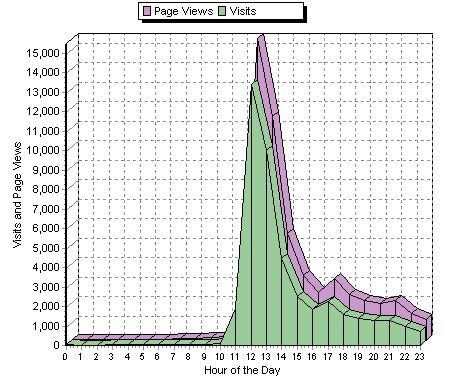I had no doubt that I would send The Internet’s Biggest Google Whores to the Digg front page. However, I was not prepared for the overwhelming response from the Digg users. This Digg was just plain MASSIVE! At last count, the story had received over 1,200 Diggs.

As you can see on the above chart, the Digg came just a few minutes before noon and hit so hard that my server admin had to increase the maximum allowable connections because of the number of Diggers trying to visit the blog. At one point there were over 3,000 people logged on. The blog did over 15,000 page views in the first hour, nearly 12,000 page views in the second hour. In less than two hours, it destroyed the previous one-day traffic record of 20,000 page views. The little bump in traffic at 17:00 came when Delicious picked up the story. When all was said and done, the blog set a new one-day traffic record of 55,856 page views.
Along the way, I received an email asking what kind of caching solution I use to be able to handle this kind of traffic. The answer is none. Unlike many WordPress blogs, John Chow dot Com is powered by two Dual Xeon servers – one handles the Apache and the other takes care of the database. This, of course, is complete overkill for a blog that average a thousand page views per day before the Diggs. However, the servers do handle others sites as well as the blog.
Now for the big question – did the Digg make any money? The good news is it made a lot more than the previous Diggs. The bad news is it’s still not much. Despite serving over 112,000 Google ads, the blog made just $95.19. That is barely enough for dinner for two. However, there is light at the end of the tunnel.
While Digg users hardly click on advertisements, a front page Digg offers many residual benefits. The first is a ton of backlinks from other sites and blogs that will link to your story. These links help to increase your Google rank for the topic written about. Already I am showing up on page 1 of Google for many financial search terms because of other sites linking me from four previous Diggs. Diggers may not click on ads, but search engine users do! So while these Diggs don’t make much initial cash, they provide something far better – residual income. That is if I decided to keep the Google ads running after the case study is over.
